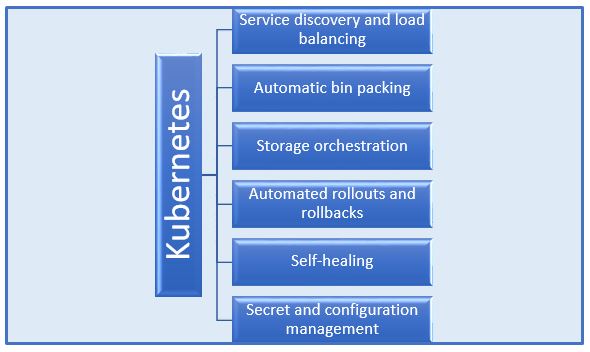11518Views 0Comments
Kubernetes – The Preferred Choice For Startups
As we experience the intensifying integration between a plethora of technologies and the business world, one segment of business, a very important and crucial one is the startup sector. Owing to its sensitive nature, any technology that is implemented and well accepted in the startup sectors must be robust enough to seamlessly take in all possible challenges, that come in the way.
One such popular technology that has been increasingly garnering good reviews and acceptance for startups is Kubernetes. A known name in the technological world, Kubernetes has carved a niche for itself, especially for startups.
What is so special about startups that need focus? There are a lot of parameters:
- Designed to scale quickly and effectively
- Volatile and unstable growth kick-off
- Focus on new technologies & innovation
- Young in business and hence need robustness
- Open arms to novel and popular technologies
As the world moved from the traditional deployment to virtualized deployment to containerized deployment, Kubernetes has understood, analyzed, and grasped the pulse of the startup sector, and no wonder, it has been a prominent choice for startups now. There are certain distinct characteristics of Kubernetes that have attracted the entire startup community towards it. Before we look at the key features, let us glance through an overview of what the world of Kubernetes is.

Kubernetes – An Overview
Kubernetes is a portable, extensible, open-source platform for managing containerized workloads and services, that facilitates both declarative configuration and automation. – Kubernetes.io
- A Google product originally, now managed by CNCF (Cloud Native Computing Foundation)
- An opensource container orchestration system
- Handles automation of application deployment, scaling, and management
- Preferred for running distributed software applications tenaciously
- A huge widely spread ecosystem with a variety of services, support, and tools
- Manages scaling and failover for applications offering different deployment patterns
As Kubernetes grew popular, there were many organizations and enterprises who opted for Kubernetes and were highly impressed with its performance. It was then, understood as good but complex technology. With time passing by, its features showcased a lot of worth which attracted the startup sector towards it. And, with startups adapting it, there was no longer a sense of complexity and awkwardness between the technology and its adapters.
Here are certain key components of Kubernetes that are instrumental in popularizing it over the various sectors of business:

Why Are Startups Keen to Implement Kubernetes?
Kubernetes has been a great choice for all, but mainly for startups, the trend is growing exponentially high. There surely must be reasons for this preference. Let us discuss these in detail:

-
Deployable On Any Infrastructure
Kubernetes is a portable, open-source and that is one big reason startups favor it. It can be deployed on any infrastructure and can execute containers easily in different environments. With the same orchestration tool, you can ensure its compatibility and flexibility.
-
Automatic Rollback
In case there is any failure, Kubernetes possesses the competence to roll it back and thereby, take care of the health of containers. There is an automatic execution of rollback and rollout barring any downtime, thereby leading to no disturbance or hassle to end-users.
-
Easy Scaling Of Servers
Kubernetes works at a single server base and hence adding/removing of new servers is an easy task. Startups get impressed with its scalable nature and hence are attracted. While scaling is automatic, even the count of executing containers can be automatically / manually modified. These scalability highlights bring Kubernetes into the limelight.
-
Thorough Security
Startups are happy with the way Kubernetes takes full-on security of their private information like passwords. This sensitive information is stored securely in Kubernetes secrets and dedicated features help in maintaining secure data, in the best possible way.
-
Big Saving On Cost And Maintenance
Since it optimizes infrastructure resources, there is a lot of efficiency in the usage of the hardware and other equipment. This saves startups on the cost angle since there is a lesser expense involved in getting in more of hardware. Startups having a limited cost schedule and resources can meet their requirements with Kubernetes.
-
Economic Powerhouse For Organizations Of All Sizes
Kubernetes has played a pivotal role in growing into an economic powerhouse for all companies alike and no wonder, startups are heavily attracted to it. Kubernetes has been creating a lot many opportunities of various categories and hence, is being termed as the most modern-day technology.
-
Cloud Independence
Kubernetes empowers startups to design and implement cloud-native apps that can be executed anywhere and turn up to be independent of cloud-specific needs. This happens so because they can get maximum utilization from containerization.
Different Tech Arms Of Kubernetes
Apart from the fact that Kubernetes has a lot many salient features that attract startups towards it, there are different arms that Kubernetes integrates with, offering a diverse range of services and solutions:
-
Kubernetes As A Service
Kubernetes as a Service (KaaS) is a technique to manage the infrastructure, networking, and storage to guarantee rapid delivery, scalability, and availability. Microsoft offers KaaS in the form of Azure Kubernetes Service (AKS), Amazon offers EKS (Elastic Kubernetes Service), but Google offers the same via GKE (Google Kubernetes Engine). In the simplest terms, it is an evolution of Kubernetes technology that ensures easy deployment, optimized operations, and scalability.
-
Kubernetes For Microservices
For an efficient Microservices architecture, you would need an automatic CI / CD process and artifact registries. Kubernetes for Microservices can help very well in executing and controlling this. Of course, there must be specific computing resources and a consistent operating infrastructure managed by a service cloud provider.
With the help of other dedicated software like Jenkins and Docker, Kubernetes can aid in manging different isolated settings, resources, storage allocations, etc. Docker has started supporting and shipping Kubernetes from its CE (community edition) and EE (enterprise edition) releases.
-
Kubernetes In DevOps
Kubernetes is of a great strength value to DevOps. With the assistance of Kubernetes, developers can share their software and needs easily with IT operations. It reduces the workload and solves the differences between different settings. Container Orchestration brings IT operations and developers nearer together, making it hassle-free for the team to work together effectively and competently with each other.
Kubernetes in DevOps offers the tool for the developers that respond to the customer demands while relying on the cloud for the burden of running applications. This is done by reducing the manual tasks that are related to installing and scaling containerized applications so that it allows to run software more consistently when shifted from one environment to another.
-
Kubernetes As Compared To Its Peers
Kubernetes is a popular technology that is being constantly compared to its peers – OpenShift and Docker Swarm. All of them are good and competitive. Popular, effective, scalable, robust, and simplistic – each one of them has its own user community to boast of.
Subsequently, OpenShift is grounded on Kubernetes and hence, there is a lot of similarity between both. Yet, there are some variances between both the platforms, depending on important parameters. Both are opensource; both have a common base with Kubernetes at the core of OpenShift; both are popular, and both aim to facilitate faster application development. Kubernetes is experienced and well-proven; it does require a proper strategy for installation. Kubernetes is a standardized version and is available on an increased number of platforms than OpenShift.
Kubernetes and Docker Swarm both work at a different level but both can be used together. Kubernetes can be integrated with the Docker engine to carry out the scheduling and execution of Docker containers. As Docker and Kubernetes are both container orchestrators which means both can help to manage the number of containers and helps in DevOps implementation. Both can automate most of the tasks that are involved in running containerized infrastructure and are open source software projects, governed by an Apache Licence 2.0.
Kubernetes – A Bright Business Future For Startups
Startups are praising Kubernetes, thanks to its wonderful characteristics, you already read the above. It was always a preferred choice for enterprises and other industries alike, but now with startups starting to trust Kubernetes is indeed, a good sign. There is so much to learn about Kubernetes and once done, it is a wonder to work with. Kubernetes is set to soar high in is popularity chart and the tech world shall leverage its potential to the best.
If you are a startup, your main aim is to grow – technically, economically, financially… Kubernetes turns out to be the apt technology to help you focus on your business rather than bothering about taking care of the infrastructure, applications, environment, and software services. Be it any eCommerce startup or SaaS based one, Kubernetes is a favored option to work on.


